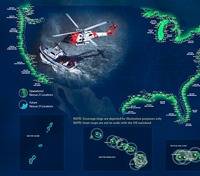ISO: Affordable & Reliable Workboat Comms
The commercial shipping world can benefit from greater range of communications and reduced satellite costs. Domestic brown water operators know all too well that’s easier said; than done. Until now.In the fast moving world of blue water, deep draft shipping, the availability of reliable ship-to-shore communications has been a non-issue for at least two decades. More than ever, they need it. These longtime users of so-called ship management software and now, sophisticated remote monitoring systems that watch over even the most obscure minutia on board far flung 1,000 foot ocean liners, need (and get) robust and reliable communications.On the domestic, brown water side of the equation? Not so much.
Search & Rescue System Accepted by US Coastguard

The U.S. Coast Guard has formally accepted the General Dynamics C4 Systems-built Rescue 21 Search and Rescue communications system now serving Sector Northern New England. With the command center located in South Portland, Maine, Sector Northern New England comprises more than 5,000 coastal miles from the New Hampshire/Massachusetts state line to the Canadian border, including Lake Champlain. Using advanced direction-finding technologies, digital communications and related enabling technologies…
10 Years After 9/11, Security Still a Top Priority of U.S. Ports
AAPA Concerned Federal Budget Cuts May Impact Port Security Progress. Port and industry leaders from throughout the Western Hemisphere will pause on Sunday, Sept. 11, as part of the 100th Annual Convention of the American Association of Port Authorities (AAPA) in Seattle (Sept. 11-15), to remember those tragically lost in the terrorist attacks on U.S. soil 10 years ago. Among those lost were 84 industry colleagues from the Port Authority of New York and New Jersey who perished at the World Trade Center. In the decade since Sept. 11, 2001, America’s seaports and the federal government have joined forces to make major gains in fortifying and hardening port facilities against intruder attack.
DHS Approves NIMS
U. S. Department of Homeland Security Secretary Tom Ridge announced approval of the National Incident Management System (NIMS), the Nation's first standardized management plan that creates a unified structure for Federal, state, and local lines of government for incident response. "NIMS gives all of our Nation's responders the same framework for incident management and fully puts into practice the concept of, 'One mission, one team, one fight,'" Ridge said. "I recognize the efforts of the dedicated professionals from state and local governments, law enforcement, the fire and emergency management communities, emergency medical services…
Lieberman Pushes for Extra $6.8B
Governmental Affairs Committee Ranking Member Joe Lieberman, D-Conn. terrorist threats that face the nation. proposal. security the focused leadership and resources it demands,” Lieberman said. · $500 million to secure air cargo, as well as trains and mass transit systems. president made in port security, bio-terror preparedness, and first responder programs. equipment, training, and other preparedness activities. than $1.8 billion since FY 2002. obtain interoperable communications equipment. reduction in tax cuts for those earning more than $1 million a year. homeland,” Lieberman said. Durbin, D-Ill., Patrick Leahy, D-Vt., John Kerry, D-Mass., and Bob Graham, D-Fla.
War Supplemental Bill Helps Ports
President Bush on May 25 signed into law H.R. 2206, a compromise Iraqi war appropriations supplemental bill that includes $110 million in additional fiscal 2007 funding for the federal Port Security Grant program, which the American Association of Port Authorities (AAPA) hailed as "a giant leap forward" to help U.S. ports secure their facilities against terrorism. An earlier, vetoed supplemental bill contained $190 million for port security grants, while the latest, enacted version provides $110 million. When added to the already appropriated $210 million, that means $320 million will be made available for port security grants in fiscal 2007.
CIBER Awarded $2.3m Port Freeport Project
CIBER, Inc. $2.3 million. port users. integrated solution. operation. will implement. the U.S. state, federal and private organizations. year. technologies," said Port Freeport's Security Manager Rick Benavidez. common operating picture. information provided by the system, too. Maritime Domain Awareness and waterside perimeter security.
Congress Passes Port Security Bill
Congress has passed the Security and Accountability for Every (SAFE) Port Act of 2006, the first legislation of its kind to authorize an annual federal funding level to help secure United States ports against terrorism. The bill, H.R. 4954, calls for $400m in federal Port Security Grant (PSG) funding for each of the next five years to help increase security in the maritime transportation system. recognized Representatives Dan Lungren (R-CA) and Jane Harman (D-CA) for introducing and moving their version of the port security legislation through the House. He credited Senators Susan Collins (R-ME; chair, Senate Committee on Homeland Security & Government Affairs) and Patty Murray (D-WA)…
AAPA Calls for “Continued Progress” in Port Security
In the nearly five years since 9/11, America’s seaports and the federal government have joined forces to make major gains in fortifying and hardening port facilities against intruder attack. “Public port authorities have made seaport security their top priority since September 11, 2001,” said Kurt Nagle, American Association of Port Authorities’ president and CEO. With the combined efforts of public ports, initiatives of federal agencies within the Department of Homeland Security (DHS) such as the U.S. Coast Guard and Customs and Border Protection (CBP), ports are significantly safer now than prior to 9/11, he noted. “Ports are a vital part of our nation’s transportation infrastructure and serve as international borders to nearly all U.S. overseas trade,” said Mr. Nagle.





